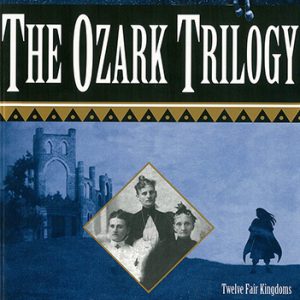calsfoundation@cals.org
Suzette Haden Elgin (1936–2015)
aka: Patricia Ann Wilkins
Patricia Ann Wilkins was a linguist, feminist, and science fiction writer from the Missouri Ozarks who adopted northwestern Arkansas as her home after retiring from teaching in the 1980s. While living in Huntsville (Madison County), she wrote her cult classic Native Tongue novels and her widely acclaimed Ozark Trilogy under the name Suzette Haden Elgin.
Patricia Ann Wilkins was born on November 18, 1936, in northeastern Missouri. Her father, Gaylord Lloyd, was a lawyer, and her mother, Hazel Wilkins, was a teacher. Wilkins had spinal polio as a child, as she related in her personal blog in the early 2000s, and refused to go through with a major surgery to treat it using bones from her hips. Instead, she opted to wear a back brace for the rest of her life, and she suffered from chronic pain.
Wilkins started college at the University of Chicago in 1954. During her freshman year, so many of the girls in her dorm were named Patricia that she decided to go by Suzette. Wilkins married Peter Joseph Haden of Washington DC in 1955; they had three children together. The family moved to San Bernardino, California, in 1963 when Peter’s work took him to the now defunct Norton Air Force Base. Peter Haden died in 1964 in San Bernardino.
Later in 1964, Suzette Haden, now twenty-seven, married George Elgin, a twenty-nine-year-old sales manager. They had one son. Suzette Elgin finished her bachelor’s degree at Chico State College (now California State University, Chico) in 1967. During college, she also performed folk music for a music show out of Redding, California. After completing a master’s degree, she pursued a PhD in linguistics from 1970 to 1973 at the University of California at San Diego. She then became an associate professor at San Diego State University.
To help pay for graduate school, Elgin began writing science fiction, including the first of her Coyote Jones series. This series features Elgin’s characteristic strong female characters and a visit to the “Ozark World,” foreshadowing The Ozark Trilogy that she would write later.
In the 1980s, Elgin retired from academia and moved to northwestern Arkansas. From her home in the Arkansas Ozarks in Huntsville, she wrote her most beloved works of science fiction: the Native Tongue novels (1984–1993) and The Ozark Trilogy (1981). The Ozark Trilogy, which was reissued by the University of Arkansas Press in 2000, consists of three books: Twelve Fair Kingdoms, The Grand Jubilee, and And Then There’ll Be Fireworks. Far in the future, settlers from the Ozarks have settled a new planet, which they name “Ozark” after their Earth home. They name the Ozark continents Kintucky, Tinaseeh, Arkansaw, Marktwain, Mizzurah, and Oklahomah. The series draws heavily on the Ozark culture that the settlers bring with them, including language, music, traditional medicine, and textile arts, like quilting.
Perhaps Elgin’s most well-known science fiction works are the Native Tongue novels, which are considered especially important works in feminist science fiction. This series is distinctive partly because of the language Elgin created for the trilogy, Láadan, created by the women in the novel to wield covert power. Elgin published a grammar and dictionary of the language, and her fans still practice Láadan in online communities. The Native Tongue novels reflect Elgin’s Ozark background but to a much lesser extent than The Ozark Trilogy. The final work in the series ends with women living in a convent in northwestern Arkansas, which Elgin depicts as a place of peace and healing.
Elgin’s most well-known nonfiction work is The Gentle Art of Verbal Self-Defense series, a practical guide to language and power. Elgin also wrote many articles, published newsletters, and kept a personal blog. Elgin founded the Ozark Center for Language Studies, an online business she ran from her home.
Elgin was awarded the Academy of American Poets Award at the University of Chicago in 1955 and the Eugene Saxon Memorial Trust Fellowship in poetry from Harper’s in 1958. Elgin was a member of Science Fiction & Fantasy Writers of America and chaired the Linguistics and Science Fiction Network. She also founded the Science Fiction Poetry Association in 1978; the organization’s Elgin Award for the best poetry book and chapbook of the year is named after her.
Elgin died on January 27, 2015.
For additional information:
Anders, Charlie Jane. “R.I.P. Suzette Haden Elgin: Author, Poet, Verbal Self-Defense Coach.” io9. http://io9.gizmodo.com/r-i-p-suzette-haden-elgin-author-poet-verbal-self-d-1684006640 (accessed August 27, 2020).
Staicar, Tom. The Feminine Eye: Science Fiction and the Women Who Write It. New York: F. Ungar Publishing Company, 1982.
Twentieth-Century Science-Fiction Writers, 3rd ed. Detroit, MI: St. James Press, 1991.
Carly Houston Overfelt
University of Massachusetts, Amherst
 Divergent Prosperity and the Arc of Reform, 1968–2022
Divergent Prosperity and the Arc of Reform, 1968–2022 The Ozark Trilogy
The Ozark Trilogy 




Comments
No comments on this entry yet.